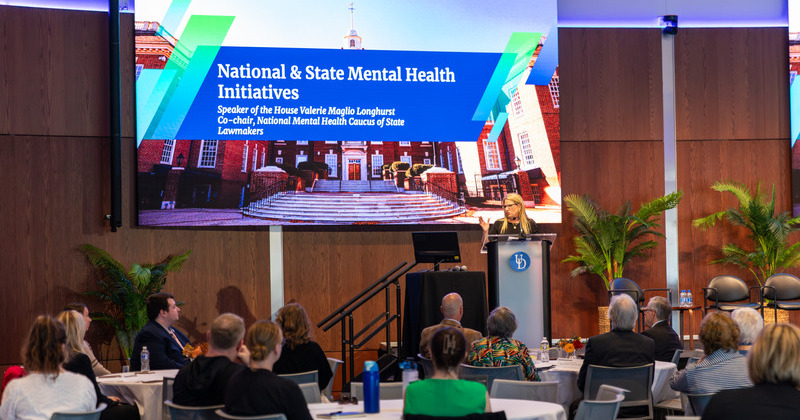
A panel of eight experts from backgrounds including politics, law enforcement, workforce development, women’s health and more joined together with hundreds of attendees on Wednesday, Oct. 25, for the 10th year of the Evelyn R. Hayes Innovations in Healthcare Symposium, hosted by the University of Delaware’s College of Health Sciences.
The Hayes Symposiums started in 2014 as a series to encourage conversation about advancements throughout healthcare, with prior symposiums covering topics such as suicide, substance abuse, diabetes, hypertension and Parkinson’s disease. This year’s Hayes Symposium was centered around innovations in care for mental health.
Evelyn R. Hayes, Trustees Distinguished Professor Emerita in the School of Nursing, sponsors the Hayes Symposiums and starts each with a call to action.
“It is here at STAR Tower that we see firsthand how research is translated into impact for patients in Delaware and beyond,” Hayes said. “I ask that we all take the opportunity to reflect on our unique skill set for meeting the needs of these patients and improve health outcomes going forward.”
Mental health initiatives
To kick off the symposium, Valerie Longhurst, co-chair of the National Mental Health Caucus of State Lawmakers and a Speaker of the House for Delaware, provided an update on national and state initiatives for improving mental health outcomes.
Since an interaction with a 14-year-old girl kicked out by her father, Longhurst has passed legislation such as bringing more counselors into schools, developing a mental health curriculum that spans K-12, and introducing a suicide prevention course for all educators and staff. She stressed the importance of each state having a mental health department, including accessible mental health experts in every school district.
“Before the COVID-19 pandemic, people weren’t paying attention to mental health,” Longhurst said. “Now the snowball effect is moving down the hill and we’re working to develop infrastructure to make lasting impacts. It’s important to start uphill, not downstream, to create access to services as soon as possible.”
Mental health landscape in Delaware
Following Valerie’s update, Joanna Champney, director of the Division of Substance Abuse and Mental Health in the Delaware Department of Health and Social Services, led a presentation entailing the current mental health landscape in Delaware.
“The NIH estimates 26% of Americans are living with a mental health disorder, while 46% will experience a disorder over their lifetime,” Champney said. “156,000 Delawareans, or roughly 15% of our total state population, reported having a mental health illness in 2021 alone. Of those, only 143,000 received treatment.”
To overcome this gap in mental health care, the state has digitized program quality assurance processes serving those who face serious and persistent mental illness, expanded use of behavioral health peers throughout channels of service, and launched a behavioral health care coordination platform, the Delaware Treatment and Referral Network (DTRN 360). This platform works to improve quality and coordination of care, reduce administrative burdens and increase access to public health services.
“We’re treating more mental health cases than ever before,” Champney said. “With new partnerships such as the Delaware Psychological Association, we’ve created easier access for patients to directly reach out to clinicians. As one of only four states without a Certified Community Behavioral Health Clinics (CCBHC), it’s essential that we create options for healthcare providers to directly serve or outsource these services and fill in mental health needs across Delaware.”
Mental health and workforce development
Doug Tynan, president of the Delaware Psychological Association, then gave a presentation titled, “Interprofessional Workforce Development and Mental Health in Delaware.” Tynan explained how the next step forward is to collectively transform attitudes and approaches toward mental health, with the goal of creating and providing sufficient professionals to serve the mental health needs of our country.
“The United States is facing a shortage of mental health clinicians,” Tynan said. “In total, there’s only 763,500 clinicians spread across 334 million people. For us, that number is as low as 1,409 clinicians to serve over a million Delawareans.”
Not only is the workforce of mental health clinicians severely limited, but as few as 60% accept insurance and most are distributed throughout New Castle and upper Kent counties, restricting access in southern Delaware. To ensure that patients can obtain care specifically when needed, mental health care requires innovations such as access to crisis stabilization on-site, a mobile crisis unit, mental health services in primary care, peer support and self-care through video guidance and apps.
“As we aim to fix primary care services throughout Delaware, it is critical that we include mental health,” Tynan said. “Looking ahead, we can improve our state’s mental health services by recognizing mental health small businesses, integrating care, creating these innovations for access and providing in-state training programs that serve all professions.”
Community impact discussion
To explore different perspectives on how mental health innovations impact Delaware communities, a panel moderated by State Representative Michael Smith included insights from Meena Ramakrishnan, epidemiologist and public health consultant; Colleen Kearns, law enforcement for New Castle County Police; Teri Lawler, school psychologist; and Charles Webbs, director for the State of Delaware Office of Evidence-Based Practice.
“It all starts with the impact on maternity,” Ramakrishnan said. “Half of our maternal deaths had a mental health diagnosis, and two-thirds of those were the result of substance abuse. There needs to be the right people available for patients to communicate with. Filling this gap is an opportunity for us to expand critical services to women during pregnancy.”
